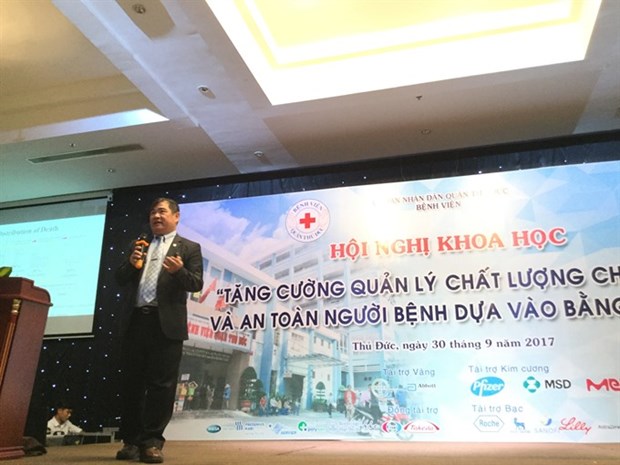 Prof Dr Ming Che Tsai, president of the Asian Health Literacy Association, presents major trauma management methods at the event (Photo: VNA)
Prof Dr Ming Che Tsai, president of the Asian Health Literacy Association, presents major trauma management methods at the event (Photo: VNA)Investment in health literacy would be a useful initiative in Vietnam and other
ASEAN countries to help reach , according to Asian
Association.
“Enhancing health literacy
will be particularly essential to provide outstanding , to
fill in the gap between the patients and healthcare providers,” Prof. Dr. Peter
Wu Shou Chang, the association’s general secretary said at Thu Duc District
Hospital’s annual conference held at the weekend.
The development of adequate
and satisfactory health literacy becomes more critically needed in modern
societies, especially in societies at which people wanted to last their lives long
without significant burdens of diseases, Chang said.
“Health literacy serves to
empower individuals, patients, their families and communities on all health
issues, including reproductive, maternal, newborn, and child health, infectious
diseases and non-communicable diseases, mental health, road safety and
preventing unintentional poisoning and injuries,” he added.
It also helps to strengthen
the health systems and health care services in countries, he said.
Health literacy helps
individuals keep healthy behaviours; maintain and promote health status; reduce
latency of fully-developed disorders; minimize the side-effects and burdens of
post-acute illnesses; facilitate early rehabilitation and comprehensive
recovery from diseases.
It is developed through
families, early education and informal life-long learning, shaped by continuous
exposure of individuals with health information and healthcare organisations.
Eventually, the status of
health literacy in individuals can protect and ensure they understand when,
where, and how to communicate with healthcare providers, and to develop
productive communication with healthcare providers, and support the individuals
and families as well as the society to become a good manager of health, he
added.
Waiting for two hours or
more at hospitals for health examinations and treatment is unavoidable and
common at many hospitals, especially overcrowded ones, Chang said, and
suggested that hospital managers should think about how to provide health education
to patients while they wait.
He advised that there are
many different ways to provide education. For instance, exciting videos to
guide disease prevention or common knowledge about health problems should be
shown on televisions in waiting areas.
One study on health
literacy and its impact on the quality of healthcare services among patients
with type 2 diabetes at Thu Duc District Hospital showed that empowering
patients via improvement of health literacy enables health-friendly
environments, better self-care with fewer health risks, and lower healthcare
costs.
The conference also heard
about many scientific research reports in the fields of administration,
surgeries, obstetrics, nutrition, public health, anaesthetic and recovery.-VNa
Source: VietnamPlus
